Frantz Fanon, Psychiatry and Politics
Creolizing the Canon
Series Editors
Jane Anna Gordon, Associate Professor of Political Science and Africana Studies, University of Connecticut
Neil Roberts, Associate Professor of Africana Studies and Faculty Affiliate in Political Science, Williams College
This series, published in partnership with the Caribbean Philosophical Association, revisits canonical theorists in the humanities and social sciences through the lens of creolization. It offers fresh readings of familiar figures and presents the case for the study of formerly excluded ones.
Titles in the Series
Creolizing Rousseau, edited by Jane Anna Gordon and Neil Roberts
Hegel, Freud and Fanon, Stefan Bird-Pollan
Theorizing Glissant, edited by John E. Drabinski and Marisa Parham
Journeys in Caribbean Thought: The Paget Henry Reader, edited by Jane Anna Gordon, Lewis R. Gordon, Aaron Kamugisha, and Neil Roberts, with Paget Henry
The Philosophical Treatise of William H. Ferris: Selected Readings from The African Abroad or, His Evolution in Western Civilization, Tommy J. Curry
Frantz Fanon, Psychiatry and Politics, Nigel C. Gibson and Roberto Beneduce
Creolizing Hegel, edited by Michael Monahan (forthcoming)
Frantz Fanon, Psychiatry and Politics
Nigel C. Gibson and Roberto Beneduce

Published by Rowman & Littlefield International Ltd.
Unit A, Whitacre Mews, 2634 Stannary Street, London SE11 4AB
www.rowmaninternational.com
Rowman & Littlefield International Ltd. is an affiliate of Rowman & Littlefield
4501 Forbes Boulevard, Suite 200, Lanham, Maryland 20706, USA
With additional offices in Boulder, New York, Toronto (Canada), and Plymouth (UK)
www.rowman.com
Copyright 2017 by Nigel C. Gibson and Roberto Beneduce
The drawings in chapter 8 are reproduced by kind permission of Francesco Pirelli. The drawings were first published in Racconti di bambini dAlgeria by Giulio Einaudi Editore in 1962.
All rights reserved. No part of this book may be reproduced in any form or by any electronic or mechanical means, including information storage and retrieval systems, without written permission from the publisher, except by a reviewer who may quote passages in a review.
British Library Cataloguing in Publication Data
A catalogue record for this book is available from the British Library
ISBN: HB 978-1-7866-0093-6
Library of Congress Cataloging-in-Publication Data Is Available
ISBN: 978-1-78660-093-6 (cloth: alk. paper)
ISBN: 978-1-78660-095-0 (electronic)
 The paper used in this publication meets the minimum requirements of American National Standard for Information SciencesPermanence of Paper for Printed Library Materials, ANSI/NISO Z39.481992.
The paper used in this publication meets the minimum requirements of American National Standard for Information SciencesPermanence of Paper for Printed Library Materials, ANSI/NISO Z39.481992.
Printed in the United States of America
Contents
APA American Psychological Association
BPD borderline personality disorder
DSM Diagnostic and Statistical Manual of Mental Disorders
FLN National Liberation Front
OAS Organisation Arme Secrete
PTSD post-traumatic stress disorder
TAT Thematic Apperception Test
Alice Cherki
For a long time, academic interest in Fanons work focused mainly on his political texts, notably Black Skin, White Masks and The Wretched of the Earth, which analyze the cultural and political oppression of the dominant over the oppressed in a colonial and postcolonial system. This was done at the expense of his little-known writing on psychiatry. In fact, Fanon published psychiatry texts on his own and with collaborators throughout his career. To this day, these writings remain understudied. Moreover, it is difficult to distinguish between Fanon the psychiatrist, Fanon the militant, Fanon the thinker, and Fanon the writer, when one has known him with these multiple facets and has followed the elaboration of his thought.
Contrary to David Maceys claim that Fanon was a conventional psychiatrist, it should be emphasized that when it came to his psychiatric work, Fanon was a precursor of sociotherapy, better known today as institutional psychotherapy. He was also a precursor in the theoretical development of the discipline, starting with his thesis, which he wrote at the age of twenty-six, under the impressive title, Mental Disturbances, Changes in Character, Psychic Disturbances and Intellectual Deficiency in Hereditary Spinocerebellar Degeneracy: A Case of Friedrichs Disease with Delusions of Possession. In the thesis, he linked three dimensions of alienation: the subjective, the cultural, and the political. We see this again in the introduction to Black Skin, White Masks in which he emphasized that alongside phylogeny and ontogeny, there is also sociogeny (Fanon 2008: xv).
The article Le trouble mental et le trouble nurologique (Mental and neurological disorders), which contains extracts from Fanons thesis, proves that he never really rejected biological or neuropathological explanations for the appearance of mental disorders. Notably, Fanons particular interest in seeing the alienated as whole persons, including their respective delusions, is already apparent here. So are the beginnings of his affirmation of the imbrication of social reality with the organization of mental disorders, as he took on the undoubtedly cumbersome reading of Lacans thesisit was only 1951. Nevertheless, he extracted from it the following: And not only can the humans being not be understood without madness, but it wouldnt be the humans being if it didnt carry within it madness as the limit of its freedom.
It is interesting to read this quote alongside what Fanon wrote some years later, in late 1956, in his letter of resignation to the governor-general of Algeria, Robert Lacoste, in which he insisted that taking care of madness is about returning freedom to the mad: Madness is one of the means by which the human being can lose their freedom and that psychiatry is the medical technique that proposes to help the human being no longer be a stranger to their environment. He added, The social structure existing in this country [colonial Algeria] is opposed to any attempt to put the individual back in their place, and further explained that the function of a social structure is to set up institutions to serve human needs. A society that drives its members to desperate solutions is a nonviable society, a society to be replaced (Fanon 2001: 61).
Fanon did not deny the existence of madness. He was no anti-psychiatrist. And even though he was revolted by the barbaric use of lobotomies and electroconvulsive therapy that took place, unaccompanied by wake-up care or talk therapy before and after, he did not refuse the use of drugs and would not have opposed the properly framed use of neuroleptics and other medication. However, he always advocated a relational, personal, and institutional context that favored the emergence of speech and the retrieval of fragments of histories suffered, silenced, forgotten, and especially censored.
The modernity of Fanons conception of psychiatry pervades all his other writings. In recent decades, pharmacology has reigned supreme and approaches to psychical suffering have been far too often linked to the pseudoscientific cataloguing of conscientiously numbered diagnostic notations for

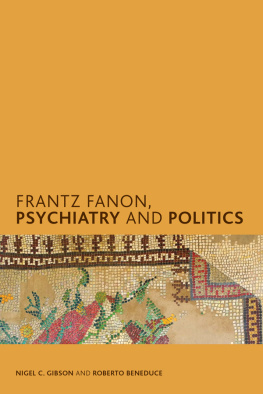

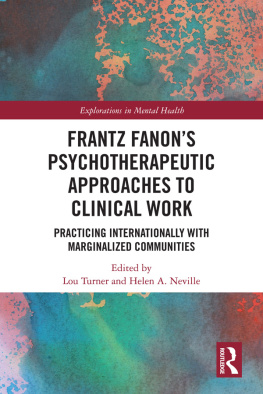

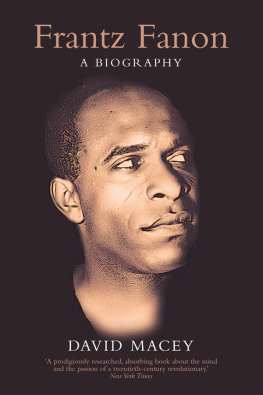

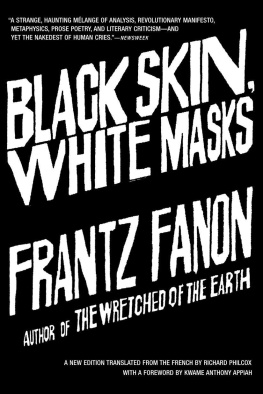
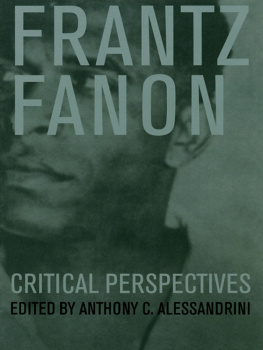


 The paper used in this publication meets the minimum requirements of American National Standard for Information SciencesPermanence of Paper for Printed Library Materials, ANSI/NISO Z39.481992.
The paper used in this publication meets the minimum requirements of American National Standard for Information SciencesPermanence of Paper for Printed Library Materials, ANSI/NISO Z39.481992.